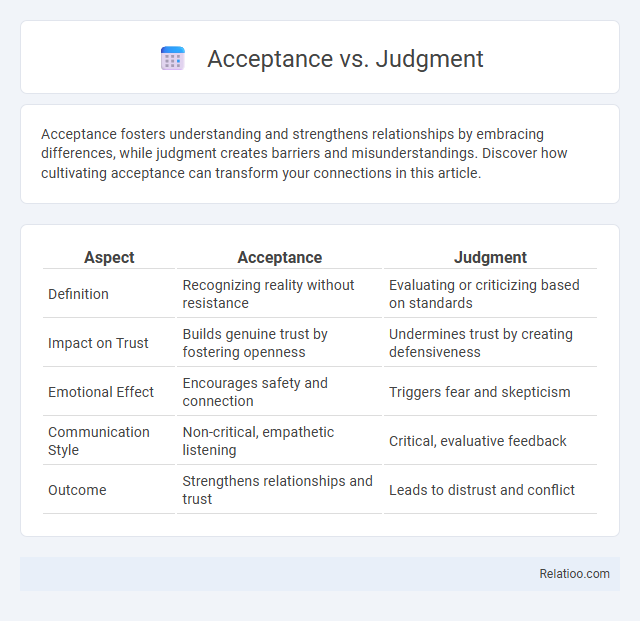Acceptance fosters understanding and strengthens relationships by embracing differences, while judgment creates barriers and misunderstandings. Discover how cultivating acceptance can transform your connections in this article.
Table of Comparison
| Aspect | Acceptance | Judgment |
|---|---|---|
| Definition | Recognizing reality without resistance | Evaluating or criticizing based on standards |
| Impact on Trust | Builds genuine trust by fostering openness | Undermines trust by creating defensiveness |
| Emotional Effect | Encourages safety and connection | Triggers fear and skepticism |
| Communication Style | Non-critical, empathetic listening | Critical, evaluative feedback |
| Outcome | Strengthens relationships and trust | Leads to distrust and conflict |
Understanding Acceptance: A Path to Inner Peace
Understanding acceptance involves embracing reality without resistance, which reduces inner conflict and promotes emotional balance. Acceptance differs from judgment by suspending criticism and allowing experiences to be as they are, fostering compassion and self-awareness. This path to inner peace enables personal growth and opens the way to redemption by healing past wounds and cultivating forgiveness.
Judgment Defined: How It Shapes Perception
Judgment defined as the mental process of forming opinions or conclusions significantly shapes perception by filtering experiences through personal biases and societal norms. This cognitive mechanism influences how you interpret others' actions and intentions, often leading to either critical assessment or unfair stereotyping based on superficial traits or preconceived notions. Understanding judgment's impact allows for more intentional, compassionate responses, promoting healthier interactions and personal growth.
Psychological Impact of Acceptance vs Judgment
Acceptance fosters emotional well-being by reducing stress, promoting self-compassion, and enhancing resilience, while judgment often leads to increased anxiety, self-criticism, and feelings of isolation. Embracing acceptance allows your mind to process experiences without harsh evaluation, facilitating healing and personal growth. Redemption, though a powerful concept of transformation, relies heavily on the foundation of acceptance to effectively overcome past mistakes and foster psychological recovery.
Origins of Judgmental Thinking
Judgmental thinking originates from deep-rooted cognitive biases and societal conditioning that prompt individuals to categorize others based on perceived differences or threats. This mindset often stems from early life experiences and cultural influences that prioritize conformity and self-protection, leading to rigid evaluations rather than empathy. Understanding the origins of your judgmental tendencies is crucial for fostering acceptance and moving toward personal redemption.
Benefits of Practicing Acceptance
Practicing acceptance reduces stress by helping you embrace reality without resistance, fostering inner peace and emotional resilience. This mindset enhances mental clarity and promotes healthier relationships by decreasing negative reactions and increasing empathy. Your ability to focus on solutions rather than problems improves, leading to greater personal growth and overall well-being.
The Cost of Living in Judgment
The cost of living in judgment often manifests as emotional burdens and strained relationships, where harsh self-assessment limits personal growth and fosters resentment. Acceptance, by contrast, encourages understanding and resilience, reducing psychological stress by embracing imperfections and circumstances without condemnation. Redemption offers a transformative path, allowing individuals to recover from judgmental attitudes and restore inner peace through self-forgiveness and positive change.
Acceptance in Relationships: Building Connection
Acceptance in relationships fosters deep connection by embracing your partner's authentic self without criticism, creating a safe space for vulnerability and trust. This unconditional acceptance nurtures emotional intimacy and reduces conflict, strengthening the bond over time. Prioritizing acceptance helps both partners feel valued and understood, laying a foundation for lasting connection and growth.
Overcoming the Habit of Judgment
Overcoming the habit of judgment requires embracing acceptance, which fosters understanding and compassion in your interactions. Judgment often stems from unconscious biases and fear, whereas acceptance opens the door to personal growth and inner peace. Redemption emerges when you replace critical thoughts with empathy, allowing your relationships and self-awareness to transform positively.
Mindfulness Techniques for Cultivating Acceptance
Mindfulness techniques cultivate acceptance by encouraging present-moment awareness without judgment, allowing you to observe thoughts and emotions objectively. Practices such as deep breathing, body scans, and non-reactive observation reduce internal resistance and foster a compassionate understanding of your experiences. This approach contrasts with judgment, which often leads to negativity, and redemption, which implies a corrective process beyond mindful acceptance.
Acceptance vs Judgment: Choosing a Healthier Mindset
Acceptance fosters emotional resilience by encouraging individuals to embrace reality without resistance, reducing stress and promoting mental well-being. Judgment often triggers negative thought patterns and self-criticism, which can escalate anxiety and hinder personal growth. Prioritizing acceptance over judgment enables healthier cognitive processing, fostering compassion and better interpersonal relationships.

Infographic: Acceptance vs Judgment
 relatioo.com
relatioo.com